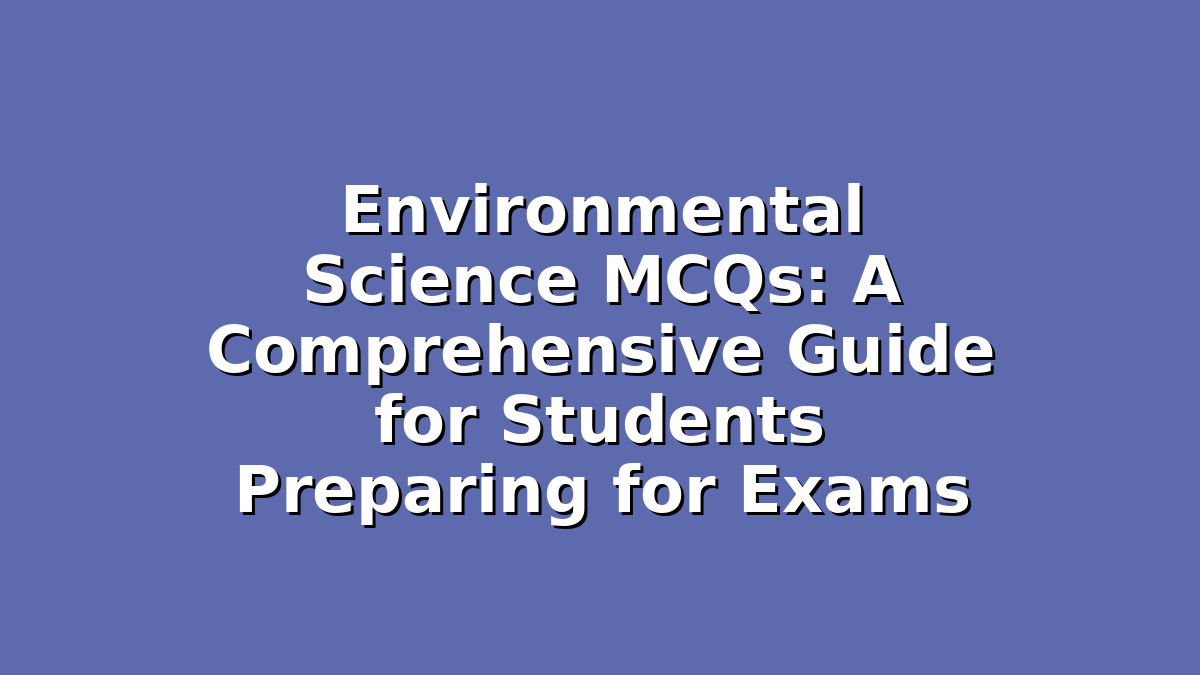Preparing for Environmental Science exams can feel overwhelming, especially when faced with vast amounts of information to memorize and understand. One of the most effective ways to study and test your knowledge is through Multiple Choice Questions (MCQs). MCQs are commonly used in exams because they help assess your grasp of key concepts quickly and efficiently. In this article, we’ll explore how Environmental Science MCQs can boost your exam preparation, provide strategies to approach them effectively, and share study tips to help you excel.
Why Environmental Science MCQs Are Important for Students
Environmental Science covers a wide range of topics such as ecology, biodiversity, pollution, climate change, and conservation. MCQs allow you to cover these diverse topics in a structured manner. They help reinforce your understanding, improve recall, and identify areas where you need more practice. Unlike essay questions that require in-depth explanations, MCQs test your ability to recognize correct information among options, making them excellent tools for self-assessment.
Additionally, practicing MCQs trains your brain to think critically and quickly, skills that are valuable during timed exams. The more questions you attempt, the better you become at eliminating wrong choices and focusing on the correct answers.
—
Section 1: Effective Techniques for Studying Environmental Science MCQs
To make the most of your study sessions, it’s essential to adopt techniques that enhance retention and comprehension. Here are some tried-and-true methods:
1. Understand the Concept, Don’t Just Memorize
MCQs often test your conceptual understanding rather than rote memorization. Instead of simply memorizing facts, aim to understand why a particular answer is correct. For example, if a question asks about the causes of deforestation, ensure you know the environmental, economic, and social factors involved.
2. Use Active Recall and Spaced Repetition
Active recall involves testing yourself repeatedly on key concepts, which strengthens memory. Spaced repetition means reviewing material at increasing intervals. Combining these two techniques with MCQs can dramatically improve your retention. Use flashcards or online quiz platforms to practice regularly.
3. Analyze Your Mistakes
Every mistake is a learning opportunity. When you get an MCQ wrong, don’t just move on. Take time to understand why your answer was incorrect. Was it due to a misunderstanding of the concept, careless reading, or confusing similar terms? Write down explanations for each mistake to avoid repeating it.
—
Section 2: How to Approach Environmental Science MCQs During Exams
Being strategic during exams can make a big difference in your performance. Here are some tips to help you tackle MCQs confidently:
1. Read the Question Carefully
The wording of MCQs can be tricky. Pay attention to absolute words such as “always,” “never,” “all,” or “none,” as these can often indicate a false option. Also, identify what the question is really asking — look for keywords and phrases.
2. Eliminate Clearly Wrong Answers First
Don’t spend too much time on one question. Start by eliminating options you are sure are incorrect. Narrowing down your choices increases your chances if you need to guess.
3. Watch Out for Similar Options
Sometimes, two or more options may look similar. In such cases, think about the subtle differences and rely on logic and what you’ve studied. If you’re unsure, go with the option that aligns best with core concepts.
4. Manage Your Time Wisely
Allocate your time based on the total questions and exam duration. If a question seems too difficult, mark it and move on to ensure you answer all the easier ones first. Return to harder questions if time permits.
—
Section 3: Recommended Resources and Study Habits for Environmental Science MCQs
To prepare effectively, using the right resources and adopting productive study habits is key.
1. Utilize Quality MCQ Books and Online Quizzes
There are many Environmental Science MCQ books designed specifically for students preparing for competitive exams. Choose ones that provide detailed explanations for answers. Additionally, websites and apps offer thousands of practice questions that mimic real exam conditions.
2. Form Study Groups
Studying with peers can motivate you and expose you to different perspectives. Quiz each other using MCQs and discuss tricky questions. Teaching others is also a great way to reinforce your own understanding.
3. Create a Study Schedule
Consistency beats cramming. Break down your syllabus into manageable sections and assign MCQ practice to each study session. Regular short sessions spread over weeks lead to better long-term retention.
4. Incorporate Visual Learning
Environmental Science is rich with diagrams, cycles, and charts — such as the carbon cycle, food chains, or water cycles. Visual aids help clarify concepts and make recall easier during MCQs.
5. Stay Updated on Current Environmental Issues
Some exams include questions on recent environmental events or policies. Follow trusted news sources or environmental organizations online to stay informed.
—
Conclusion: Mastering Environmental Science MCQs to Ace Your Exams
Environmental Science MCQs are a powerful study tool that, when used strategically, can enhance your understanding and exam performance. Remember to focus on conceptual clarity rather than memorizing answers, practice regularly with a variety of questions, and analyze your mistakes to learn and improve. During the exam, approach questions methodically, manage your time well, and trust your preparation.
With patience, persistence, and the right resources, you can confidently tackle Environmental Science MCQs and achieve great results. Keep practicing, stay curious about the environment, and let your passion for learning guide you to success.
Good luck with your studies!

Responses